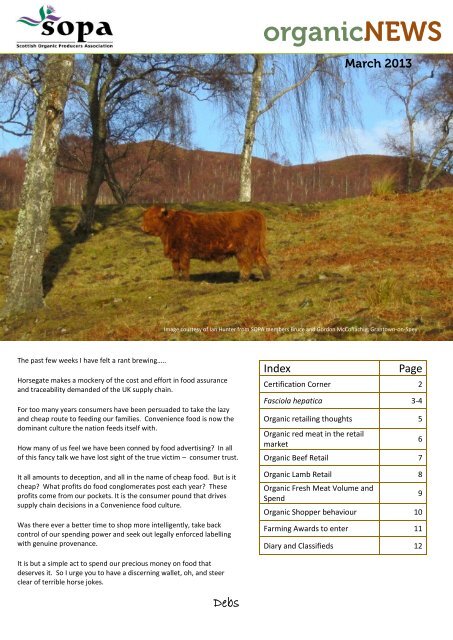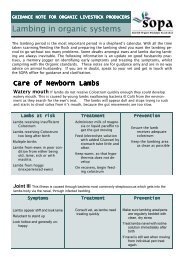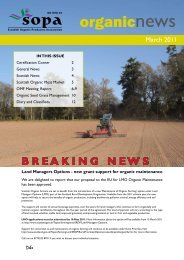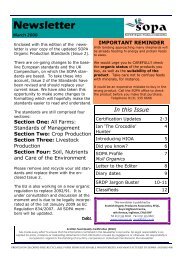organicNEWS - Scottish Organic Producers Association
organicNEWS - Scottish Organic Producers Association
organicNEWS - Scottish Organic Producers Association
You also want an ePaper? Increase the reach of your titles
YUMPU automatically turns print PDFs into web optimized ePapers that Google loves.
<strong>organicNEWS</strong><br />
March 2013<br />
Image courtesy of Ian Hunter from SOPA members Bruce and Gordon McConachie, Grantown-on-Spey<br />
The past few weeks I have felt a rant brewing…..<br />
Horsegate makes a mockery of the cost and effort in food assurance<br />
and traceability demanded of the UK supply chain.<br />
For too many years consumers have been persuaded to take the lazy<br />
and cheap route to feeding our families. Convenience food is now the<br />
dominant culture the nation feeds itself with.<br />
How many of us feel we have been conned by food advertising? In all<br />
of this fancy talk we have lost sight of the true victim – consumer trust.<br />
It all amounts to deception, and all in the name of cheap food. But is it<br />
cheap? What profits do food conglomerates post each year? These<br />
profits come from our pockets. It is the consumer pound that drives<br />
supply chain decisions in a Convenience food culture.<br />
Was there ever a better time to shop more intelligently, take back<br />
control of our spending power and seek out legally enforced labelling<br />
with genuine provenance.<br />
Index<br />
Page<br />
Certification Corner 2<br />
Fasciola hepatica 3-4<br />
<strong>Organic</strong> retailing thoughts 5<br />
<strong>Organic</strong> red meat in the retail<br />
market<br />
<strong>Organic</strong> Beef Retail 7<br />
<strong>Organic</strong> Lamb Retail 8<br />
<strong>Organic</strong> Fresh Meat Volume and<br />
Spend<br />
<strong>Organic</strong> Shopper behaviour 10<br />
Farming Awards to enter 11<br />
Diary and Classifieds 12<br />
6<br />
9<br />
It is but a simple act to spend our precious money on food that<br />
deserves it. So I urge you to have a discerning wallet, oh, and steer<br />
clear of terrible horse jokes.<br />
Debs
CERTIFICATION CORNER—Producer Members<br />
ORGANIC MILKING<br />
COWS AND SHEEP<br />
Some of the veterinary licenses for<br />
flukicides have changed recently.<br />
The situation is becoming more<br />
complex for milk producers.<br />
We recommend that organic dairies<br />
milking cows (or sheep) contact your<br />
vet to discuss options for treating<br />
liver fluke.<br />
See page 4 and 5 for more<br />
information on liver fluke.<br />
Dealing with non-compliances<br />
When a non-compliance is raised at inspection or audit, this is<br />
what you are required to do:<br />
1 - You have 30 days from the date of your INSPECTION to submit<br />
satisfactory corrective action to the SFQC/SOPA office to address<br />
any non-compliances raised. Following your inspection the office<br />
will send out a courtesy letter confirming the non-compliance and<br />
to remind you of the non-compliance(s) raised and the deadline<br />
for corrective action.<br />
2 - If we do not hear from you within 30 days, a FINAL REMINDER<br />
letter will be sent to you. This letter will remind you that<br />
corrective action is still outstanding giving you a further 5 days to<br />
submit the relevant information required.<br />
3 - Failure to submit corrective action after the additional 5 days<br />
are offered will result in the SUSPENSION of your certificate. You<br />
will not be able to sell any organic produce until satisfactory<br />
corrective action is received and approved by the certification<br />
team.<br />
Please ensure at the time of your inspection you ask your inspector<br />
for clarification if you are unsure of the details of any noncompliance<br />
that is raised. Alternatively following your inspection<br />
if you still have queries please contact the office within the 30 day<br />
timescale to discuss further. Please do not ignore any noncompliances<br />
that are raised as we have no option other than to<br />
suspend your certificate if appropriate corrective action is not<br />
received within the timescale detailed above.<br />
Seed Derogations—Another reminder<br />
Download derogation forms from www.sopa.org.uk/members/downloads (you will need to log in to your<br />
SOPA account to access these)<br />
Single Variety seeds<br />
PRIOR TO PURCHASE<br />
Seed mixes<br />
(derogation required for the non-organic allowance in the mix)<br />
PRIOR TO SOWING<br />
Contacting the Office—0131 335 6606<br />
If automated call directs irritate you, call us direct on 0131 335 6606.<br />
This number will take you straight to the SOPA team in the SFQC office.<br />
We like email too!<br />
info@sopa.org.uk<br />
2
Time to address your Fasciola hepatica plan<br />
As we approach spring turnout in the next month or<br />
so, the SOPA TAC (Technical Advisory Committee)<br />
have asked that I remind organic livestock producers<br />
about liver fluke (Fasciola hepatica) management.<br />
Managing Liver fluke in organic systems is something<br />
the <strong>Organic</strong> Monitor Farm Community Group have<br />
been discussing. The big challenge is treating organic<br />
stock during the fattening period and meeting the<br />
required withdrawal period.<br />
It’s ok to treat for fluke<br />
The majority of SOPA livestock management plans we<br />
see in the office have a fluke management<br />
programme so SOPA members should have no<br />
reluctance to use appropriate flukicides if animals are<br />
infected.<br />
How do you know if you have fluke?<br />
Always ask the abattoir for a liver report. However,<br />
be aware that this report will only tell you if there is<br />
fluke damage to the liver—it will not specify if the<br />
damage is from active (alive) fluke, or if it is scarring<br />
from historic infection. The important thing is to find<br />
out if the animal had live fluke damage because you<br />
can use this evidence to treat the rest of the herd/<br />
flock.<br />
You can test dung for fluke eggs but due to the fluke<br />
life cycle (see below), regular tests will be necessary<br />
over a period of 1-3 weeks. The animal will shed fluke<br />
eggs for only 2 weeks so regular sampling helps<br />
gather accurate evidence.<br />
Moredun Institute are trialling blood test for fluke<br />
infection—these hope to be more accurate than<br />
current testing regimes and if successful will certainly<br />
help accurate diagnosis, and by inference accurate<br />
treatment.<br />
Ask your Vet<br />
Your vet should be able to help you devise a<br />
programme to treat infected animals. You should<br />
then record this programme in your SOPA Livestock<br />
Management Plan, and remember the office will need<br />
to approve any changes. Just email it in to<br />
info@sopa.org.uk. If re-infection is a threat, all stock<br />
will probably have to be treated. Different products<br />
treat different stages of the fluke and it is important<br />
to avoid overuse that may lead to product resistance<br />
or misuse (see over). We understand that fluke has<br />
become prevalent throughout all of Scotland in recent<br />
years and with the ill-effects on animal health and<br />
welfare there is really no excuse not to treat.<br />
THE LIFE CYCLE OF THE LIVER FLUKE<br />
2 weeks<br />
24 hours<br />
4-8 weeks<br />
3 days<br />
6 months<br />
Day 1<br />
Day 15<br />
Day 16<br />
Day 44-72<br />
Day 73-76<br />
Day 77-257<br />
Eggs secreted in dung to external environment<br />
Eggs hatch and must find secondary host (mud snail)<br />
First larval stage infiltrate mud snail<br />
Larvae excreted from snail<br />
Larval attach to blade of grass and build a protective cyst<br />
Grass eaten; animal ingests the cyst<br />
A mature<br />
fluke is flat<br />
and no larger<br />
than a penny<br />
24 hours Day 258<br />
3 days Day 258-261<br />
6-8 weeks Day 303-317<br />
Immature fluke emerges from cyst and travel into animal intestine<br />
Immature fluke burrows from intestine into animal liver<br />
Fluke penetrates and infects liver until mature<br />
3
Managing Fasciola hepatica on organic farms<br />
The SOPA standards require double the withdrawal period<br />
The following table shows some of the products available on the market that can be used to treat fluke.<br />
Please note this list is not exhaustive, there are other products available to help avoid resistance but check<br />
with your vet first and ensure your SOPA Livestock Management Plan is approved by the SFQC office.<br />
FLUKICIDES ONLY Owned by Active ingredients Treat for<br />
<strong>Organic</strong> withdrawal<br />
period<br />
Species<br />
Fasinex 5%<br />
Fasinex 10%<br />
Flukiver<br />
Trodax 34%<br />
Novartis Animal<br />
Health UK Ltd<br />
Novartis Animal<br />
Health UK Ltd<br />
Elanco Animal<br />
Health<br />
Merial Animal<br />
Health Ltd<br />
5% w/v triclabendazole<br />
10% w/v triclabendazole<br />
5% w/v closantel<br />
34% w/v nitroxynil<br />
Tribex 5% Chanelle Vet UK Triclabendazole<br />
liver fluke (Fasciola hepatica)<br />
112 Sheep<br />
liver fluke (Fasciola hepatica)<br />
112 Cattle<br />
chronic & sub-acute<br />
fascioliasis<br />
84 Sheep<br />
mature & immature<br />
Fasciola hepatica<br />
120<br />
98<br />
Cattle<br />
Sheep<br />
Early immature, immature<br />
and adult fluke<br />
112 sheep<br />
COMBINED FLUKE &<br />
WORMERS<br />
Owned by Active ingredients Treat for<br />
<strong>Organic</strong> withdrawal<br />
period<br />
Species<br />
Combinex Cattle<br />
Novartis Animal<br />
Health UK Ltd<br />
7.5% w/v levamisole<br />
hydrochloride & 12%<br />
w/v triclabendazole<br />
parasitic bronchitis,<br />
parasitic gastroenteritis<br />
& fasciolosis<br />
112 Cattle<br />
Combinex Sheep<br />
Novartis Animal<br />
Health UK Ltd<br />
3.75% w/v levamisole<br />
hydrochloride & 5%<br />
w/v triclabendazole<br />
parasitic bronchitis,<br />
parasitic gastroenteritis<br />
& fasciolosis<br />
112 Sheep<br />
Flukiver<br />
Elanco Animal<br />
Health<br />
closantel 5% w/v<br />
fascioliasis (due to Fasciola<br />
hepatica), Sheep<br />
Nasal Bot Fly (Oestrus<br />
ovis) & Barber Pole<br />
worm (Haemonchus<br />
contortus)<br />
84 Sheep<br />
Albex 10%<br />
Chanelle Vet UK<br />
Ltd<br />
Albendazole 10% w/v<br />
Roundworm, lungworm,<br />
tapeworm, adult fluke<br />
also worm and fluke<br />
eggs<br />
28<br />
10<br />
Cattle<br />
Sheep<br />
Check each product is suitable for the species and remember that justification will be required for combined<br />
products (faecal egg count for worms).<br />
Top Tips<br />
The egg can survive on<br />
vegetation for months if the<br />
environment is suitable i.e. wet,<br />
light and acidic—to—normal pH<br />
ie rushy pasture<br />
Mature fluke will live for<br />
up to 12 weeks in the liver<br />
of an animal and can lay<br />
eggs from 8 weeks<br />
www.noahcompendium.co.uk<br />
Is an extremely useful resource for all<br />
vetmeds—persevere with the website<br />
as navigation is not the simplest<br />
4
Retailing organic –some thoughts for 2013<br />
The following article is written by Vanessa Henry,<br />
Shopper Insight Manager at IGD.<br />
You can find out more at w.igd.com/our-expertise/Shopper-Insight/ethicsand-health/12470/Three-tips-to-help-you-enhance-the-popularity-of-yourorganic-food-ranges/<br />
The last few years have brought challenging times for<br />
Three tips to help you<br />
enhance the retail<br />
popularity of organic food<br />
some shoppers and economic concerns are beginning<br />
to have an impact on ethical shopping. Although sales<br />
of most ethical products held up well in the early<br />
stages of the recession, such an extended squeeze on<br />
household finances is inevitably taking its toll. But it’s<br />
not all doom and gloom; if your company has a stake<br />
in the organic food market, these three tips are<br />
designed to help you use shopper behaviour to your<br />
advantage.<br />
1. Inspire loyalty<br />
When households are under pressure and<br />
focused on making their money go further, it is<br />
more challenging to entice uncommitted<br />
shoppers with organic ranges. However, IGD<br />
Shopper Research (Based on ShopperVista research<br />
carried out in October 2012) shows that there is<br />
still a substantial group, more than one in seven<br />
shoppers (15%), claiming to be loyal to organic<br />
food.<br />
Tip: There remains an opportunity to build your<br />
custom with these loyal shoppers by continuing to<br />
invest in organic ranges and expanding their appeal. If<br />
others are putting less investment into organic then<br />
your innovative products will stand out.<br />
2. Be Natural<br />
According to IGD research, the ‘natural’<br />
benefits are the top reason for choosing organic<br />
products - it ranks highest for both those who<br />
have purchased organic foods in the last month<br />
and those who haven’t.<br />
Tip: Companies can succeed by being creative in<br />
communicating their natural credentials with shoppers<br />
– the Yeo Valley ‘rapping farmers’ campaign<br />
showed that being entertaining rather than earnest<br />
can spread the appeal. Mainstream food advertising is<br />
concentrated around price and functionality, so<br />
organic products can stand out by taking a different<br />
line. Linking together various benefits from organic<br />
food in new and imaginative ways could be highly<br />
5<br />
effective.<br />
3. Value-added benefits<br />
Beyond the loyal followers, there’s another<br />
substantial group of shoppers to target. One<br />
in ten (11%) say they will come back to<br />
organic foods when they have a bit more<br />
money. Another 9% are focusing their organic<br />
purchases on a few products.<br />
Tip: Although most shoppers’ ethical aspirations are<br />
not dented during a recession, their ability to pay<br />
can be. For this price conscious group, the priority is<br />
to reinforce the value of your products by better<br />
showcasing the benefits from spending a relatively<br />
small amount extra.
<strong>Organic</strong> Red Meat Retail Sales Data<br />
The following retail sales data (© Kantar Worldpanel 2013) was presented at the annual SAC Consulting <strong>Organic</strong><br />
Prospects conference on 31st January 2013. The information complements the production data published in<br />
the <strong>Organic</strong> Market Link Annual <strong>Organic</strong> Producer Survey 2012-2013 by Caroline Shahin of SAC Consulting. It is<br />
a rare exclusive that we are able to access data of this quality and accuracy so hopefully you will find it of<br />
value.<br />
The data is extracted from retail sales from 2011 to 2012 for the main UK multiple retailers (supermarkets).<br />
Of key note is that despite challenging market conditions organic red meat sales continue to perform. There<br />
is clearly consumer demand for organic red meat and in pure economic terms demand is out-stripping supply<br />
as the premia demonstrate. Imports are not affecting the organic market at the current time. Farm gate<br />
prices for beef are at an all time record high of 440-450 ppkgdw, with a premium of 65 pence or more.<br />
<strong>Organic</strong> lamb has been slow to shift off farm in the past two months but prices have maintained a premium.<br />
There has been a lot of uncertainty in the meat processing sector in the past few months that will have<br />
affected procurement.<br />
UK <strong>Organic</strong> Beef Retail Sales<br />
9,000<br />
8,000<br />
7,000<br />
6,000<br />
5,000<br />
Q1 Q2 Q3 Q4 Q1 Q2 Q3 Q4<br />
2011 2012<br />
Volume (000 Kgs)<br />
Spend Share (£%)<br />
Expenditure<br />
(£000s)<br />
<strong>Organic</strong> Red Meat Retail Sales Data—BEEF<br />
Retail Measure of <strong>Organic</strong> Beef Cuts<br />
<strong>Organic</strong> Prospects, 31st January<br />
2013<br />
© Kantar Worldpanel<br />
Note the growth in volume sales of beef joints and diced/stewing, driven by the reduced price. This will be<br />
perceived as ‘better value’ by the consumer, so more is sold.<br />
UK Retailer Performance on<br />
<strong>Organic</strong> Beef<br />
<strong>Organic</strong> Prospects, 31st January<br />
2013<br />
© Kantar Worldpanel<br />
Note the dramatic growth in Sainsbury's who have extended their lead in organic beef sales by nearly 10% of the<br />
market share. Morrisons and the Co-op are negligible players in the organic beef market (no surprise) but the fall<br />
in Waitrose share is one to watch. Asda’s loss of market share will be due to their shopper demographic —those<br />
seeking value in tight economic times.<br />
7
<strong>Organic</strong> Red Meat Retail Sales Data—LAMB<br />
Retail Measure of <strong>Organic</strong> Lamb Cuts<br />
<strong>Organic</strong> Prospects, 31st January<br />
2013<br />
© Kantar Worldpanel<br />
Note the increase in price for lamb joints seems to be reducing the volume sold per shopping trip. Lamb<br />
mince is performing well and a fall in price of steak has seen an increase in sales, but not for chops. There is<br />
no market for diced or stewing lamb.<br />
UK Retailer Performance on<br />
<strong>Organic</strong> Lamb<br />
<strong>Organic</strong> Prospects, 31st January<br />
2013<br />
© Kantar Worldpanel<br />
Like beef, Sainsbury’s have taken a strong lead in 2012. This lead is at the expense of competitor retailers so<br />
Sainsbury's appear to be gaining customers and managing to convince the new customers to spend on organic<br />
lamb. Waitrose has a stronger market share of organic lamb (down ~2% to ~18% in 2012) than organic beef<br />
(down ~5% to 10% in 2012, see page 7).<br />
8
<strong>Organic</strong> Red Meat Retail Volume and Spend<br />
These graphs show<br />
organic fresh meat sales<br />
in the years 2011 and<br />
2012. Kantar Worldpanel<br />
produce this data<br />
from the 5 main UK<br />
multiple retailers<br />
(Sainsburys, Tesco, Asda,<br />
Marks and Spencer,<br />
Waitrose).<br />
<strong>Organic</strong> beef sales make<br />
up around 75% of all<br />
fresh organic meat sales<br />
in the multiple retailers.<br />
<strong>Organic</strong> lamb sales are<br />
20% of the total volume<br />
of organic fresh meat<br />
sold and pork and other<br />
meats around 5%.<br />
UK Retail Volume Share – <strong>Organic</strong><br />
Fresh Meat<br />
100%<br />
90%<br />
80%<br />
70%<br />
60%<br />
50%<br />
40%<br />
30%<br />
20%<br />
10%<br />
0%<br />
7.7 7.1 6.1 5.7 5.6 5.4 4.5 3.8<br />
18.4 21.6<br />
19.5 18.3 18.2 20.5<br />
72.7 70.9 74.2 75.3 75.2 73.5<br />
16.2 20.2<br />
78.4 75.7<br />
Q1 Q2 Q3 Q4 Q1 Q2 Q3 Q4<br />
2011 2012<br />
Other<br />
Fresh Pork<br />
Fresh Lamb<br />
Fresh Beef<br />
© Kantar Worldpanel<br />
Again, this graph is<br />
produced by Kantar<br />
Worldpanel and shows<br />
the sales value of fresh<br />
organic meat sales in the<br />
UK multiples, during<br />
2011 and 2012.<br />
The amount of money<br />
spent on organic lamb<br />
peaked at 24.4% of<br />
organic fresh meat sales<br />
in Quarter 3 of 2011,<br />
closely followed by<br />
another good<br />
performance in Q4 of<br />
2012 (23.5%)<br />
More money was spent<br />
on organic beef (74.9% of<br />
organic fresh meat sales)<br />
in Q3 of 2012 than any<br />
other quarter in the two<br />
year period shown.<br />
UK Retail Spend Share – <strong>Organic</strong><br />
Fresh Meat<br />
100%<br />
90%<br />
80%<br />
70%<br />
60%<br />
50%<br />
40%<br />
30%<br />
20%<br />
10%<br />
0%<br />
7.1 7.5 6.7 5.5 5.2 5.4 4.7 3.6<br />
21.5 23.4 24.4 23.2 21.3 23.3<br />
70.6 68.7 68.8 70.8 72.8 71<br />
20 23.5<br />
74.9 72.7<br />
Q1 Q2 Q3 Q4 Q1 Q2 Q3 Q4<br />
2011 2012<br />
Other<br />
Fresh Pork<br />
Fresh Lamb<br />
Fresh Beef<br />
© Kantar Worldpanel<br />
9
<strong>Organic</strong> Shopper Behaviour<br />
Recent consumer behaviour research (©IGD ShopperVista 2012) shows that one in four consumers will<br />
remain loyal to buying organic food. Animal welfare, rather than being green, is now more important to<br />
shoppers than three years ago. The ‘natural’ image is still the key driver for organic purchases.<br />
More people are interested<br />
in organic food now than<br />
they were 3 years ago (41%<br />
of people surveyed in 2009<br />
said they were not<br />
interested in organic food, in<br />
2012 this figure had gone<br />
down to 37%). Clearly still<br />
some work to do.<br />
Anecdotal evidence tells us that<br />
free range has been a strong winner<br />
against organic sales in supermarkets—particularly<br />
eggs, table<br />
birds and bacon. Price has a major<br />
impact—people believe that<br />
buying free range is much<br />
cheaper and as good as organic<br />
8% of shoppers surveyed have<br />
lost faith in what they thought<br />
organic stood for— but this<br />
figure has been static over the<br />
past three years. As an<br />
industry, we need to ask why<br />
they have lost their trust in the<br />
label and how we can change<br />
their mind<br />
Summary:<br />
UK consumers are animal-lovers.<br />
High welfare products are a growth<br />
area and it is vital to reinforce these<br />
quality credentials in marketing messages.<br />
<strong>Organic</strong> businesses may notice<br />
the closing gap between organic and<br />
free range. Free range has closed the<br />
perception gap to animal welfare in<br />
organic production and has done a<br />
good job at building a culture of high<br />
animal welfare in the consumer’s<br />
mind.<br />
15% will continue to buy organic<br />
food and 11% will buy more<br />
organic food when their income<br />
improves, so we need to<br />
promote to this group how<br />
organic food prices are not<br />
always more expensive and<br />
careful scrutiny of supermarket<br />
shelves reveals the same price<br />
for some organic foods as the<br />
non organic equivalent.<br />
There is a strong perception that<br />
the UK has higher welfare<br />
standards than any other<br />
country. This indicates a<br />
national pride factor as well as a<br />
boost to local food sales where<br />
provenance and traceability are<br />
important to consumers.<br />
Animal welfare is still a major<br />
driver for consumer purchases.<br />
More than one in four shoppers<br />
will try and buy high animal<br />
welfare including free range.<br />
The media are strong<br />
influencers on shopper<br />
behaviour—especially the<br />
rise of tv chefs and<br />
cooking programmes<br />
where a particular product<br />
is featured. If a programme<br />
shows intensive<br />
chicken rearing it will drive<br />
up sales of extensive, free<br />
range and organic.<br />
10
FARMING AWARDS 2013 —NOMINATE NOW<br />
Nominations and applications for the Future Farming<br />
Award are being encouraged as the 2013 Award<br />
searches for the best in <strong>Scottish</strong> agriculture.<br />
Seeking innovation within <strong>Scottish</strong> farming and crofting, this<br />
accolade rewards the individual or partnership that can<br />
demonstrate an outstanding contribution to rural industry.<br />
The Award aims to showcase ways in which Scotland can produce<br />
food, fibre and wood products from farms and crofts in a<br />
commercially viable way while maintaining the natural capital of the<br />
land and minimizing the ecological footprint of farming activities.<br />
The judges are looking for anything which represents new or<br />
innovative ideas within farming. Interested parties should visit<br />
www.futurefarmingaward.co.uk for information on how to apply.<br />
The closing date for applications is Friday 22 March.<br />
The Farmers Weekly Awards recognise and reward farmers for innovation,<br />
commitment to the industry and hard work.<br />
www.farmersweeklyawards.co.uk<br />
<br />
<br />
<br />
<br />
<br />
Five reasons to enter or nominate someone<br />
Recognition for you, your family and your team, and your sector<br />
Opens doors to new industry contacts, clients and supplier deals<br />
Valuable PR and marketing for your business<br />
Greater business confidence and negotiating power<br />
The chance to experience the best night out in farming for you and your partner<br />
Farmer of the Year Categories include Arable, Beef, Contractor, Countryside, Dairy, Diversification,<br />
Farm advisor, Farm manager, Farm worker, Green energy, Local food, Pig, Poultry, Sheep, Young<br />
Entries close 30th April 2013– nomination and entry forms online<br />
25 TH ANNIVERSARY FOR SCOTTISH EGG QUALITY AWARDS<br />
This year marks the 25 th anniversary of the<br />
<strong>Scottish</strong> Egg Quality Awards competition and<br />
the organisers, BOCM PAULS and Scotland’s Rural<br />
College (SRUC) intend to mark this milestone<br />
competition with a special awards presentation<br />
ceremony at the Huntingtower Hotel, Perth on<br />
Thursday 23 rd May. The competition is aimed at<br />
encouraging the pursuit of excellence in egg quality,<br />
to provide benchmark standards of quality that are<br />
both realistic and achievable and to recognise the<br />
highest quality and consistency standards achieved by<br />
successful entrants. Eggs will be collected in late<br />
11<br />
March and taken to SRUC Auchincruive for testing<br />
and assessment. Scotland’s Rural College carries out<br />
quality assessments on eight key parameters: shell<br />
colour, egg weight, yolk colour, albumen quality, shell<br />
thickness, freedom from meat and blood spots,<br />
external appearance and packaging.<br />
Further information from: Iain Campbell, BOCM<br />
PAULS: 07803 286724 or Nick Sparks, SRUC: 01292<br />
525100
ORGANIC CLASSIFIEDS<br />
DIARY DATES<br />
All of the Classifieds are also published on the SOPA website http://www.sopa.org.uk/classifieds and added to<br />
the SOPA <strong>Organic</strong> Commodity Register. Please contact the advertiser direct and ALWAYS ask for the organic<br />
certificate.<br />
WANTED<br />
Approx 8 tonnes of <strong>Organic</strong> Feeding Barley required<br />
Please contact Alaster on 07515 280036<br />
<strong>Organic</strong> malting barley: a steady supply throughout<br />
2013 is required near Inverness. Telephone 01463<br />
811 118<br />
Summer grazing<br />
<strong>Organic</strong> summer grazing for approx. 150 ewes with<br />
lambs. Central Borders area. Well fenced with<br />
adequate water supply Telephone. 01896 860 244<br />
(Bergius, SOPA 452)<br />
<strong>Organic</strong> store cattle and sheep<br />
Required for summer grazing and foggage in<br />
Aberdeenshire. Contact Brian Anderson (SOPA 1174)<br />
07967677464<br />
FOR SALE<br />
<strong>Organic</strong> Grazing, Summer 2013<br />
35 acres organic grass available to rent for grazing<br />
or cropping, Aberdeenshire. Contact Alex McLean-<br />
Bullen (SOPA 066) tel 07831 782 917<br />
<strong>Organic</strong> Hay for sale<br />
Approx 30 <strong>Organic</strong> Round bales hay for sale,<br />
Aberdeenshire. Contact Alex McLean-Bullen (SOPA<br />
066) tel 07831 782 917<br />
Wiltshire Horn ewes with lambs at foot<br />
22 organic Wiltshire Horn ewes with lambs at foot.<br />
Wool-less "easy care" type sheep. Ease of lambing,<br />
docile, good mothers. Strong lambs born 1st week<br />
of Feb. Will sell as a whole or in smaller numbers.<br />
Tups also available. Call David on 07515264094<br />
(SOPA 296)<br />
HUNTLY MART<br />
The Annual Spring Sale of <strong>Organic</strong> Store<br />
Cattle will be held on Thursday April 18th @<br />
10 am<br />
For further details contact<br />
Douglas Guild<br />
United Auctions<br />
Huntly Auction Mart<br />
HUNTLY<br />
AB54 4QU<br />
Tel: +44 (0) 1466 792148<br />
Fax: +44 (0) 1466 794550<br />
Mob: +44 (0) 7764 464371<br />
DUMFRIES MART<br />
Spring Sale of <strong>Organic</strong> cattle on Monday<br />
15th April, 10.30am<br />
For Further details contact<br />
Dumfries Mart<br />
Huntingdon Road<br />
Dumfries<br />
Tel 01387 279 495<br />
This newsletter is published by<br />
<strong>Scottish</strong> <strong>Organic</strong> <strong>Producers</strong> <strong>Association</strong>, SFQC, Royal Highland Centre,<br />
10th Avenue, Ingliston, EH28 8NF<br />
Tel 0131 335 6606 Fax 0131 335 6601<br />
www.sopa.org.uk info@sopa.org.uk<br />
<strong>Scottish</strong> Food Quality Certification (SFQC) and <strong>Scottish</strong> <strong>Organic</strong> <strong>Producers</strong> <strong>Association</strong> (SOPA)<br />
has made every effort to ensure that the information contained in this Newsletter is accurate. No legal responsibility is accepted for errors, omissions<br />
or misleading statements in that information caused by negligence or otherwise. No responsibility is accepted in regard to the standing of any firms,<br />
companies or individuals mentioned in this Newsletter.







